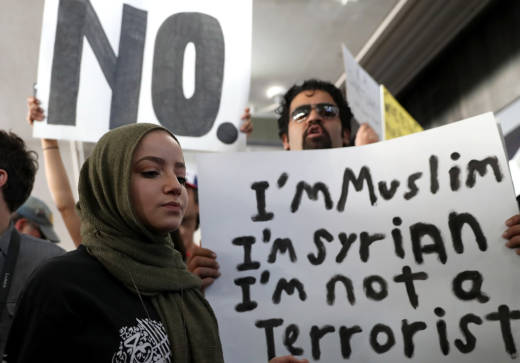"Has the president ever disavowed his campaign statements -- has he ever said, 'I said before I want to ban all members of the Islamic faith from entering the United States of America, I was wrong, I have consulted with lawyers, I am now addressing it simply to security?' "
"Yes, Judge Hawkins, he has said several things approaching that," Wall replied, saying that over time it's become clear that Trump was really talking about Islamic terrorist groups, not all Muslims.
Hawkins was joined by Circuit Judges Ronald M. Gould and Richard A. Paez -- all Bill Clinton appointees -- to hear more than an hour of oral arguments by Wall and attorney Neal Katyal, who is representing the state of Hawaii.
Katyal argued that Trump is overstepping his executive authority, noting that in 2015 Congress considered whether the people from countries cited in the travel ban posed a broad threat, but decided that requiring them to secure visas was sufficient to protect the U.S.
Kaytal said the government couldn't point to anything specific Trump has said to disavow his promise of a Muslim ban "because in truth there is no such statement."
By contrast, he argued, the plaintiffs cited Trump's statements both before and after he became president calling for a ban based on religion "chapter and verse."
Katyal said upholding the travel ban would do away with decades of immigration law and precedent.
"The law has always been, even when there is a delegation of authority (by Congress), it still has to be viewed within the context of a broader immigration scheme, and to view it the way they do would allow the president to take a magic eraser to the entire code," he said.
Another 9th Circuit panel already refused to reinstate the travel ban in February, ruling that it does not believe the Trump administration is likely to succeed upon appeal, or that the administration demonstrated that the ban needs to be instated. That case was brought by the states of Washington and Minnesota, and joined by more than a dozen other states including California.
Another lawsuit, brought by the state of Maryland, also resulted in an injunction against the travel ban, but a more narrow one.
The judges hearing the Hawaii case didn't give much indication which way they would rule. Hawkins pressed Wall on why the government is arguing the court should take only Trump's "good" statements seriously and discount "bad" things he said. But he also asked Kaytal why the court shouldn't "be deferential to the office of the president of the U.S. in this situation?"
"That's the million-dollar question," Kaytal replied, arguing that the question is not what the president says he means but what a neutral observer would infer from his own words.
Katyal cited the hundreds of groups -- including governments, faith groups, labor unions and even conservative groups -- who are supporting Hawaii's position.
"They are all coming before you and saying, look, this is unprecedented -- we have not seen anything like this within our lifetimes, in which a president is establishing a disfavored religion."
